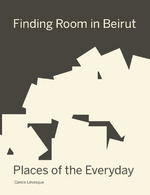Finding Room in Beirut: Places of the Everyday
Author(s)
Lévesque, Carole
Collection
ScholarLedLanguage
EnglishAbstract
Finding Room in Beirut: Places of the Everyday demonstrates why it is worth our while to explore the value and contemporary meaning of urban areas about to undergo complete renewal. Branching off from discourses surrounding the terrain vague, the book argues that large populated urban areas meet the criteria of the vague and constitute a particular perspective from which to build a critical stance in regards to the contemporary city. But unlike a terrain vague, a vague urbain — inhabited areas where property ownership is usually obscure and informal behaviours a daily affair — possesses real communities and offers an alternative understanding on how a city can be practiced and how lessons should be learned before its complete transformation. Stemming from a photographic and architectural documentation of Bachoura, a central area of Beirut, Lebanon, the book shows how the vague urbain allows for different ways of inhabiting, ways that are as — or perhaps even more — real and anchored in the imagination of the city as those proposed by standardising developments. Building on the intricacies of found situations, improvised uses and local narratives, it is an exploration as to how the meeting of a marvellous realism with l’intrigue, the vague urbain, and temporary architecture can provide opportunities for the emergence of hidden narratives.
Keywords
urban design; Beirut; architecture; Lebanon; political geography; terrain vague; cultural studiesDOI
10.21983/P3.0243.1.00ISBN
9781947447622, 9781947447615OCN
1100493803Publisher
punctum booksPublisher website
https://punctumbooks.com/Publication date and place
Brooklyn, NY, 2019Classification
Urban and municipal planning and policy


 Download
Download